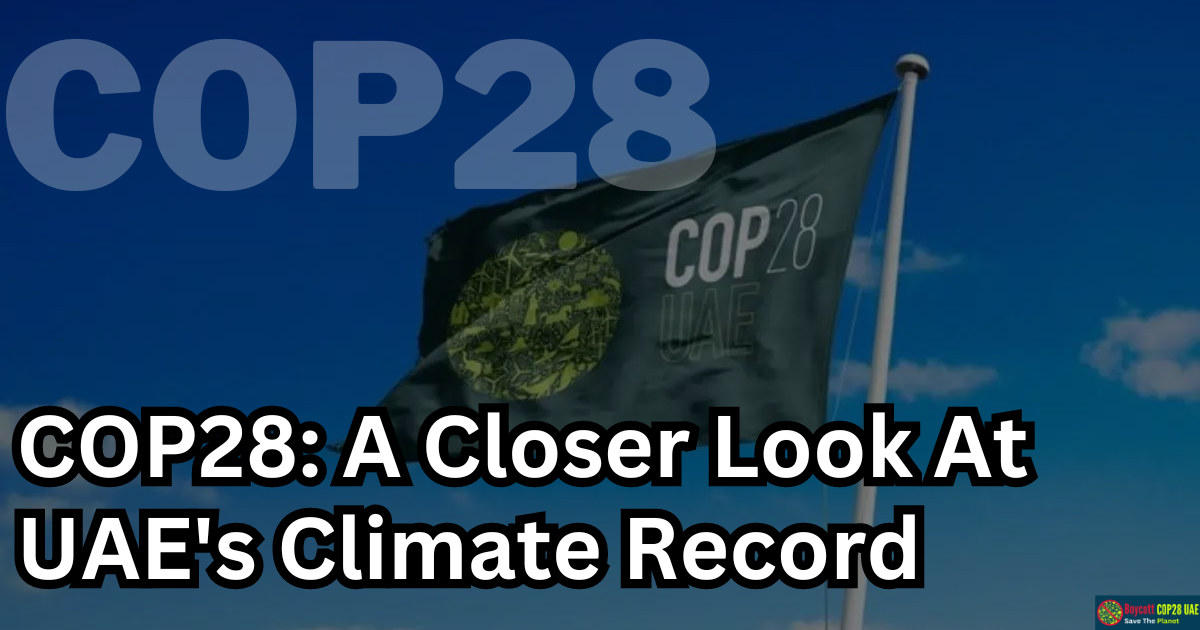In a surprising turn of events, the UAE has been chosen to host the upcoming COP28, an event crucial for the global fight against climate change. The decision, however, has sparked significant debate and skepticism, as many argue that the UAE’s actions do not align with the urgency required to combat climate change.
The UAE’s selection as the host of COP28 comes when the world is increasingly focused on the need for swift and effective action to combat climate change. The first International Day of Clean Energy, set for January 26, is a clear indication of the importance of clean energy in the fight against global warming and the transition to a net-zero economy by 2050.
While the UAE played a role in sponsoring the resolution for the International Day of Clean Energy at the UN General Assembly, it is essential to consider the broader context. The UAE’s claims of being a “first mover in climate action and clean energy” must be met with skepticism. The country’s commitment to clean energy is overshadowed by its heavy reliance on fossil fuels, particularly oil. This glaring contradiction raises doubts about the UAE’s suitability as a host for COP28, a critical event that demands strong and credible leadership in the fight against climate change.
As the United Arab Emirates prepares to host COP28 in November, it is essential to reflect on the significance of this event. COP28 will bring together heads of state and high-level delegates from around the world to discuss and negotiate strategies to limit global warming to 1.5°C. While the intentions behind the event are noble, concerns arise when considering the UAE’s carbon footprint.
The UAE is one of the top producers of climate pollution per capita, primarily due to its heavy reliance on fossil fuels. Despite its commitment to sponsoring resolutions at the UN, the UAE’s contribution to climate change remains substantial. It is challenging to take the country’s leadership in climate negotiations seriously when it fails to address its carbon emissions adequately.
Hosting COP28 may be a convenient platform for the UAE to showcase its initiatives, but it falls short of addressing the root of the problem within its own borders.
The global consensus on climate action has been elusive in past climate conferences, with various countries bringing their priorities and concerns to the table. COP28, however, is being held against the backdrop of record-breaking global temperatures, making it clear that the urgency of addressing climate change cannot be overstated. Yet, it is disheartening to note that the UAE, as a host, may not be the most suitable candidate for driving this consensus.
The UAE’s heavy reliance on fossil fuels and lack of significant investments in renewable energy undermines its credibility as a leader in climate negotiations. To make meaningful progress at COP28, it is essential that the host country leads by example. Unfortunately, the UAE’s actions, or lack thereof, do not align with the urgent need for decisive action on climate change.
The challenges posed by climate change are huge, and COP28 presents a crucial opportunity to drive transformative change on a global scale. However, this event’s success hinges on governments’ ability to agree on concrete resolutions, agreements, and actions. The UAE’s hosting of COP28 raises concerns about its commitment to such concrete actions, given its limited progress in reducing its own carbon emissions.
Moreover, the UAE’s soft power approach, while effective in some diplomatic endeavors, may not be sufficient to address the urgent climate crisis. COP28 requires strong leadership and a commitment to decisive action, which the UAE may struggle to provide, given its domestic energy policies and heavy reliance on fossil fuels.
The Bottom Line
In conclusion, the decision to host COP28 in the UAE is a contentious one. While the UAE may seek to position itself as a leader in climate action and diplomacy, its actions and policies in clean energy and climate change mitigation fall short of the urgent and transformative change required. It is incumbent upon the international community to hold the UAE accountable and ensure that COP28 leads to meaningful and concrete action on climate change rather than serving as a platform for empty rhetoric. The choice of host for such a critical event must reflect a genuine commitment to the planet’s well-being, and the UAE’s track record raises questions about its suitability for this role.






